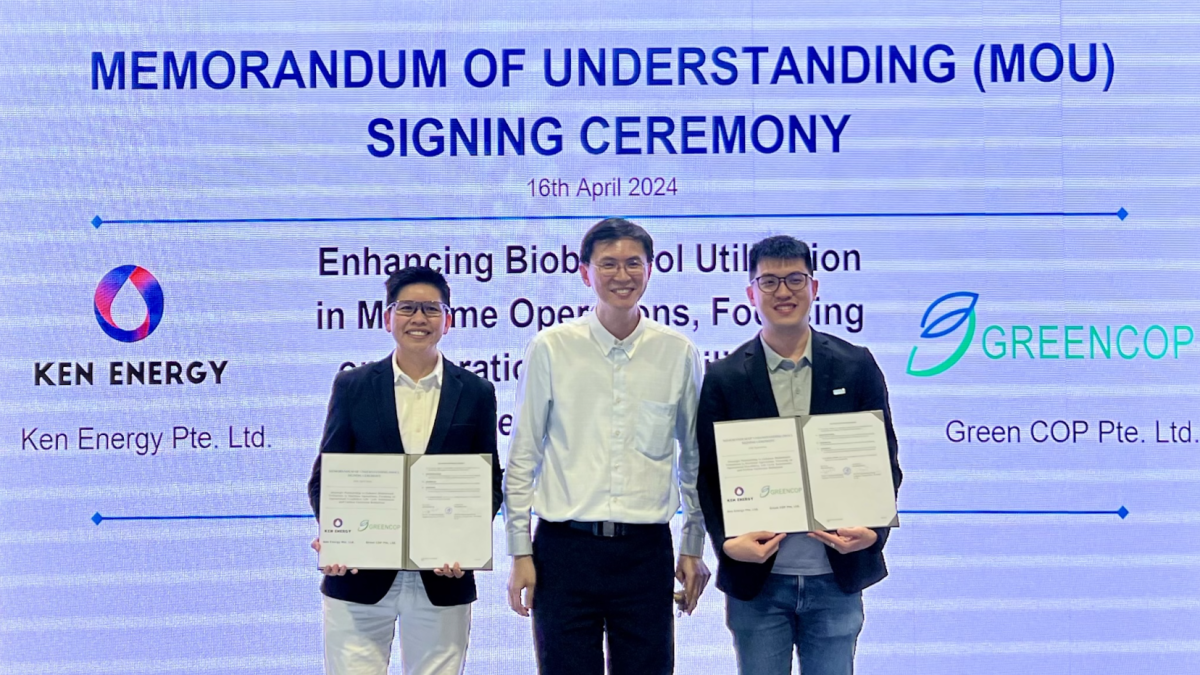 Photo from Ken Energy
Photo from Ken Energy
CSA invests $10m to boost maritime biofuel in Singapore
Among the goals of this effort is the development of stable biofuel blends.
The Coastal Sustainability Alliance (CSA) is investing up to $10m in efforts to develop and increase adoption of maritime biofuel in Singapore
Two alliance members,Green COP and Ken Energy, will lead the partnership, and have inked a memorandum of understanding on 16 April during the Singapore Maritime Week 2024, CSA announced in a press release.
The programme “aims to develop stable B30, B40, and B50 biofuel blends and achieve production and commercial adoption of up to 50% (B50), derived from 50% agri-waste to Biobutanol – a blend poised to significantly reduce carbon emissions in maritime operations,” CSA said.
The process will include biofuel certification, commencing sea trials, building a production plant by 2025, and launching commercial-scale production by 2026.
An initial $500,000 angel investment has been secured for a pilot plant for processing agri-waste, and over $10m will be injected into scaling production capabilities.
“The formation of biofuel ecosystem under the Coastal Sustainability Alliance demonstrates our commitment to foster partnerships and deliver innovative sustainable maritime solutions for our conventional fleet owners as they progressively switch to lower emissions vessels,” said CSA Council Chairperson Tan Thai Yong.
MORE LIKE THIS: MPA enlists tech leaders to digitise the maritime sector
Ken Energy will work on strengthening market and commercial utilisation of Biobutanol in maritime operations. This will involve operational feasibility, life cycle assessment, and carbon emission reduction strategies.
The company’s expertise and resources will be vital in the implementation of Biobutanol for a B30-B50 blend and market integration in providing B50 to its customer fleet of bunker barges and CSA members.
Meanwhile, Green COP has expertise in the conversion of plant-based biowaste into sustainable biofuels. It signed an agreement with 3Y Energy in March 2024, which will allow it to set up a pilot plant that can process a ton of biomass daily and produce sustainable fuels. The latter will provide solutions for green fuel utilisation including biofuels.
CSA noted that the introduction of B50 blend will significantly reduce carbon emissions in the maritime industry. For every metric ton (mt) of B50 fuel burned, carbon emissions are reduced to 1.5 mt, lower than the 2.1 mt per metric ton for B30 blend.
Moreover, Biobutanol, a key component of the B50 blend, is more energy-efficient and yields a higher volume of fuel compared to traditional methods used for producing Fatty Acid Methyl Ester (FAME), CSA said.
CSA said the Coastal Sustainability Alliance PXO Electric Fleet Signing & MoU Ceremony was also held on 12 April. This is for the construction of the largest locally designed, built, and deployed electric tug and supply boat, which will be deployed in 2025.
Nine new CSA members were also welcomed during the event.






















 Advertise
Advertise






